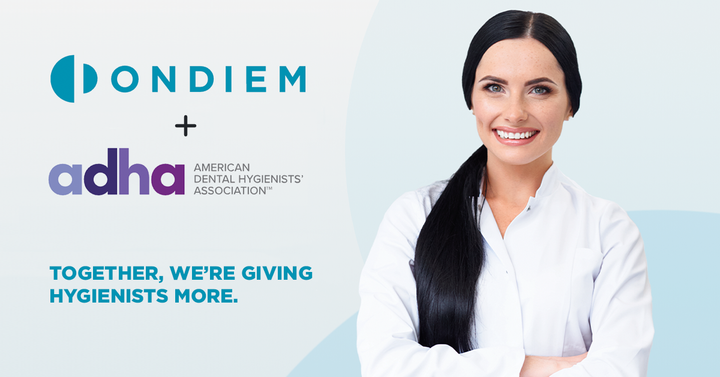American Dental Hygienists’ Association and onDiem Announce New Partnership
The new partnership is designed to help dental hygienists cover membership dues and health care expenses.

A new partnership between onDiem and the American Dental Hygienists' Association (ADHA) is designed to provide additional benefits to dental hygienists.
Eligible dental hygienists who both find work through onDiem and sign up as ADHA members will be able to receive discounts on their ADHA memberships along with up to $3,000 each year in onDiem Care Benefits which can be used for a range of health and wellness expenses.
“We’re passionate about helping dental hygienists not only find jobs, but also the kind of flexible work and protections that enable them to avoid burnout, build financial stability, and enjoy fulfilling careers in dentistry,” says Joe Fogg, Founder and CEO of onDiem. “We’ve partnered with the ADHA—the consistent advocate for the dental hygiene community at the federal, state, and local levels—to help dental hygienists feel cared for, and to expand their access to all the perks and benefits of an ADHA membership.”
The membership discounts are made available due to matching deductions from onDiem, according to a press release. The onDiem Care Benefits provide up to $250 each month for costs including things such as child and elder care, gym memberships, wellness retreats, copays, prescriptions, deductibles, and more.
“At the height of the pandemic, we were proud to help our dental hygienists continue to find ways to deliver essential care across the country—in the midst of great personal risk and uncertainty,” adds Dawn Ann Dean, RDH, MSDH, ADHA 2022-2023 President. “As the ADHA celebrates its 100th anniversary this year and embarks on a new century, we’re excited to partner with onDiem, a company that shares our vision and values.”
For more information on the partnership visit the official onDiem-ADHA partnership website.
How Dentists Can Help Patients Navigate Unforeseen Dental Care
December 12th 2024Practices must equip patients with treatment information and discuss potential financing options before unexpected dental treatments become too big of an obstacle and to help them avoid the risk of more costly and invasive procedures in the future.